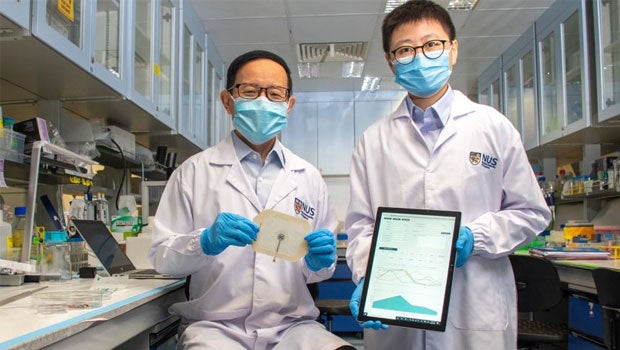HealthXchange will NEVER ask you to transfer money over a call. If in doubt, call the 24/7 ScamShield helpline at 1799, or visit the ScamShield website at www.scamshield.gov.sg.

Professor Lim Chwee Teck (left) decided to make this device so they can tell what the specific bacteria types are and the inflammatory factors. PHOTO: NATIONAL UNIVERSITY OF SINGAPORE
SINGAPORE - A bandage developed by scientists here can monitor infection and vital indicators about chronic wounds, with the information relayed to doctors to allow them to hold a consult with patients remotely.
The bandage is part of a point-of-care wound assessment platform called VeCare, which also includes an electronic chip and a mobile app.
Created by a research team from the National University of Singapore (NUS) and clinical partners from Singapore General Hospital, the bandage's sensor technology is believed to be the first of its kind.
The VeCare bandage is targeted at people with chronic wounds such as venous leg ulcers.
It can detect temperature, pH, bacteria type and inflammatory factors specific to chronic wounds within 15 minutes, enabling fast and accurate assessment.
The bandage assesses the wound's micro-environment as well as its infection and inflammation state through biomarkers from the wound's fluid using an electrochemical system.
A chip connected to the sensor transmits data wirelessly to the mobile app for real-time wound assessment.
This allows doctors to track the patient's healing progress and determine whether further treatment is needed.
The VeCare bandage complements the patient's existing medical treatment while allowing medical intervention for wound healing processes to be more timely.
The research team behind the bandage hopes that more patients can monitor their chronic wounds at home, thus reducing hospital visits.
Professor Lim Chwee Teck, director of NUS Institute for Health Innovation and Technology, is the lead researcher for the project.
He said: "Currently, we assess wounds using visual inspection. But doctors can't tell if there's still infection in the wound (via visual inspection). That's why we decided to make this device to place directly on the wound so they can tell what the specific bacteria types are and the inflammatory factors."
The next stage of development for the VeCare bandage will involve clinical tests on about 50 to 100 patients spanning one to two years, before it is rolled out to other patients in around two years.
Get the Health Buddy App
© 2025 SingHealth Group. All Rights Reserved.













 Get it on Google Play
Get it on Google Play